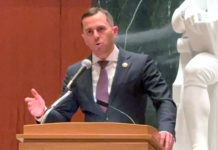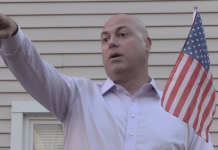Jersey City Ward E Councilman James Solomon is standing by local legislation he helped craft to regulate short-term rentals, like Airbnb, exclaiming that “corporations shouldn’t write public policy” ahead of what looks to be a bitter referendum campaign.
“On November 5th, everyone will have a chance to vote on whether you should pass the [Airbnb] ordinance drafted by the council. The mayor’s office put a first draft out, I worked with Councilwoman Prinz-Arey, all members of the council, to draft a bill that was similar – made a few changes,” Solomon said at a fundraiser at the Gia Gelato & Cafe on Thursday.
” … Fundamentally, what we did, was put in place sensible regulations. We said if you own a one- to four-[bedroom] family and you want to rent out your basement, you want to rent out some rooms in your house: you should be able to do that. But it shouldn’t become a major tool investment.”
Solomon continued that approximately 10 percent of his ward, Downtown Jersey City, consists of short-term rentals, will inevitably expand if the new regulations are voted down on November 5th.
He also was quick to point out that the changes, such as limiting the number of buildings investors could set aside for short-term rentals, are about introducing sensible restrictions, not imposing a ban.
“It’s wrong, it’s not what the bill does and I understand that there are different views: it’s a tough issues where there are genuinely different view points, but what I hope we all agree on is that corporations shouldn’t write public policy and the electeds in this city worked very hard to come up with a compromise.”
The councilman’s remarks came about a day-and-a-half before Airbnb hosts kicked of their “Keep our Homes” campaign, where organizers insisted that short-term rentals would become obsolete in Jersey City if the referendum passes this fall.
Keep Our Homes campaign spokesman Graeme Zielinski doubled down on the notion that passing the referendum would be the equivalent of a short-term rental ban in Jersey City.
“This ordinance creates a ban, plain and simple. Jersey City voted to put sensible short-term rental regulations in place in 2015, but the mayor and city council never followed through with setting up the system,” he said.
“Now instead of reasonable regulations they are pushing a ban, and short-term rental hosts had no choice but to bring this issue directly to the voters.”











So hotels like Wyndham and Hyatt have hundreds of rooms and set the short term rental market cost. Owners of 5 units are apparently to blame. Luxury high rise rental developers make thousands of units and set the long term rental cost. Still, blame an owner of 5 units for long term rental costs. The city keeps drumming to the same beat:. Shake hands with developers and screw over the homeowner. Never mind education in JC is an abomination, but let’s continue to hammer on homeowners (property tax, no parking, and now limit Airbnb). Is there any hiding the fact that the mayor and the assembly are pro developer and anti resident?
The negative effects of corporate Airbnb on communities is undeniable.
https://www.epi.org/publication/the-economic-costs-and-benefits-of-airbnb-no-reason-for-local-policymakers-to-let-airbnb-bypass-tax-or-regulatory-obligations/
https://www.nytimes.com/2019/07/17/nyregion/airbnb-new-jersey.html
https://www.politico.com/states/f/?id=00000163-b83a-dd91-abe7-b93fe0380001
https://www.usnews.com/news/cities/articles/2019-05-02/airbnbs-controversial-impact-on-cities
Marc – maybe you should educate yourself on the negative effects of corporate Airbnb’ers, it’s undeniable.
Start here:
https://www.epi.org/publication/the-economic-costs-and-benefits-of-airbnb-no-reason-for-local-policymakers-to-let-airbnb-bypass-tax-or-regulatory-obligations/
https://www.nytimes.com/2019/07/17/nyregion/airbnb-new-jersey.html
https://www.politico.com/states/f/?id=00000163-b83a-dd91-abe7-b93fe0380001
https://www.usnews.com/news/cities/articles/2019-05-02/airbnbs-controversial-impact-on-cities
The proposed ordinance has 0 sense. It aims to ban the vast majority of the STR operators and hurt local businesses. Also, let us not forget that Jersey City pretty much invited hosts to come in in 2015, with the prior ordinance, and now doing 180. It is clear the new ordinance was drafted by someone with no business sense.
The new ordinance doesn’t ban airbnb at all, if you are an owner-occupied airbnber, nothing has changed. The ordinance only limits investor/corporate airbnb, these non-owner occupied mini-hotels and are destroying neighborhoods, and this was never the intention when allowed several years ago.
I rent my apartment in JC Heights and pay high rent. If I have to go away for the weekend I should be able to offset my rent and airbnb my apartment. As a tenant, I don’t think this legislation allows for that – only “owner-occupied” – so where does that leave me? the type of person that Airbnb was created for? a tenant that’s trying to afford to stay in their rental apartment?